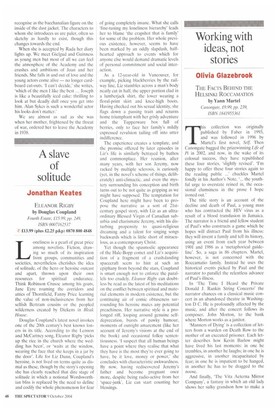A slave of solitude
Jonathan Keates
ELEANOR RIGBY by Douglas Coupland Fourth Estate, £15.99, pp. 249, ISBN 0007162537 1-:1£13.99 (plus 12.25 p&p) 0870 800 4848 -/-4 oneliness is a pearl of great price among novelists. Fiction, drawing so much of its inspiration
from groups, communities and societies, nevertheless cherishes the idea of solitude, of the hero or heroine outcast and apart, thrown upon their own resources for spiritual endurance. Think Robinson Crusoe among his goats, Jane Eyre roaming the corridors and attics of Thornfield, Fanny Price learning the value of non-inclusiveness from her selfish Bertram cousins or the peopled wilderness created by Dickens in Bleak House.
Douglas Coupland's latest novel invokes one of the 20th century's best known loners in its title. According to the Lennon and McCartney song, Eleanor Rigby 'picks up the rice in the church where the wedding has been', or 'waits at the window, wearing the face that she keeps in a jar by the door'. Life for Liz Dunn, Coupland's heroine, is not lived on terms quite as dismal as these, though by the story's opening she has clearly reached that dire stage of solitude in which a notional Wordsworthian bliss is replaced by the need to define and codify the whole phenomenon for fear of going completely insane. What she calls 'fine-tuning my loneliness hierarchy' leads her to blame 'the crapshot that is family' for some of the problem. Her whole previous existence, however, seems to have been marked by an oddly slapdash, halfhearted approach to events which for anyone else would demand dramatic levels of personal commitment and social interaction.
As a 12-year-old in Vancouver, for example, picking blackberries by the railway line, Liz stumbles across a man's body neatly cut in half, the upper portion clad in a lumberjack shirt, the lower wearing a floral-print skirt and knee-high boots. Having checked out his sexual identity, she flags down a passing train and returns home triumphant with her grisly adventure and the Tupperware box full of berries, only to face her family's mildly expressed revulsion tailing off into utter indifference.
The experience creates a template, and the promise offered by later episodes in Liz's life is similarly betrayed by bathos and commonplace. Her reunion, after many years, with her son Jeremy, now racked by multiple sclerosis, is curiously (yet, in the novel's scheme of things, deliberately) anti-climactic, and even the mystery surrounding his conception and birth turns out to be not quite as gripping as we might have supposed. The temptation for Coupland here might have been to propose the narrative as a sort of 21stcentury gospel story, with Liz as an ultraordinary Blessed Virgin of Canadian suburbia and charismatic Jeremy, with his disturbing propensity to quasi-religious dreaming and a talent for singing songs backwards which is little short of miraculous, as a contemporary Christ.
Yet though the spasmodic appearance of the Hale-Bopp comet and Liz's acquisition of a fragment of a crashilanding spacecraft seem to hint at such an epiphany from beyond the stars, Coupland is smart enough not to enforce the parallels too crudely. Eleanor Rigby can doubtless be read as the latest of his meditations on the conflict between spiritual and material elements in modern existence, but the continuing air of comic obtuseness surrounding his heroine mutes any potential preachiness. Her narrative style is a prolonged riff, looping around genuine selfdeprecation, bursts of pawky humour, moments of outright amazement (like her account Of Jeremy's visions at the end of the book) and occasional folksy sententiousness. '1 suspect that all human beings have a point where they realise that what they have is the most they're ever going to have, be it love, money or power,' she concludes with characteristic awkwardness. By now, having rediscovered Jeremy's father and become pregnant once more, despite being radio-active from her `space-junk', Liz can start counting her blessings.


















































































































 Previous page
Previous page